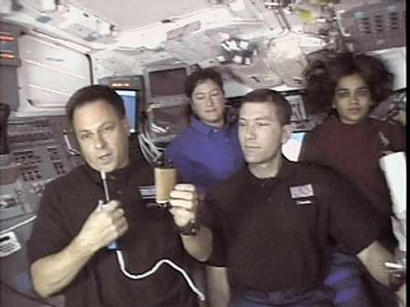Astronaut lifted nation's spirits
By Herb Keinon. From: Jerusalem Post, Jan. 22, 2003
When he was in space, with Jewish and Israeli items, Astronaut Ilan Ramon lifted the nation's spirits.

Ilan Ramon, holding a miniature Torah scroll, during a televised conversation with Prime Minister Ariel Sharon (January 21, 2003) (REUTERS/NasaTV).
Holding a tiny Torah that has gone from Bergen-Belsen to outer space, Israeli astronaut Col. Ilan Ramon said in a live hook-up Tuesday that this scroll represents the Jewish people's eternal ability to survive.
Speaking to Prime Minister Ariel Sharon from the space shuttle Columbia, Ramon displayed the wallet-sized Torah which he gingerly took out of a plastic bag and said it symbolizes "more than anything the ability of the Jewish people to survive everything, including horrible periods, and go from the darkest days to days of hope and faith in the future."
In his first live, on-camera comments to Israel since lifting off last Thursday, Ramon said, "I want to say that from here, in space, Israel looks like it appears on the map, small, but beautiful.
Sharon, flanked by Education Minister Limor Livnat and Israel Space Agency officials Aby Har-Even and Yuval Ne'eman, took 30 minutes off from a very earthly election campaign to watch and listen to Ramon aboard Columbia.
"I think that the people of Israel, and the Jewish people as a whole, are a wonderful people," Ramon said, obviously aware that the nation's eyes were upon him. "We have wonderful people in Israel. I think it is very, very important to preserve our historical tradition, and I mean historical and religious traditions."
Ramon briefly told the story of the Torah scroll, which at one point floated for an instant out of his hand.
"It is a small Torah scroll that 60 years ago a little boy in Bergen-Belsen received from the rabbi of Amsterdam. The rabbi taught him from it for his bar mitzva. That 13-year-old boy read the weekly portion from this Torah. It was with him since then. That boy, Yehoyahin Yosef, survived the Holocaust, arrived in Israel, fought in the country's wars and then went on to become a distinguished professor of planetary physics," Ramon said.
Today he is overseeing the Israeli experiment on the shuttle on how dust and pollution affect the Earth's climate.
"I am moved to hold this," Ramon said. Yosef related the story of the Torah scroll to The Jerusalem Post in 1951.
"What do you see from there that we don't see from here?" a relaxed and smiling Sharon asked Ramon.
"We see the earth, which is beautiful," Ramon said.
Ramon was flanked during the 20-minute conversation by three of his crewmates Rick Husband, commander of the crew, Kalpana Chawla, and Laurel Clark.
Sharon, ever prime ministerial, elicited a smile from Ramon when he told the Israeli astronaut to extend his greetings to the crew from Jerusalem, "the capital of the Jewish people for 3,000 years, and until eternity." Later he invited the crew to visit Jerusalem, again emphasizing but this time in English the city's history.
During the conversation, broadcast live on radio and television, Sharon made sure to thank US President George W. Bush and former president Bill Clinton for involving Israel in the space program.
Among some 30 guests, in addition to journalists, invited to the Prime Minister's Office to watch the conversation were four ninth-grade students from a high school in Jerusalem's Gilo neighborhood. One of the students, Itai Simhoni, asked Ramon what his most significant and unexpected experience has been so far.
The most moving experience, outside of looking out the window, was the experience of floating, Ramon said.
"You don't see us float now, because we have to stay in front of the camera, but the floating going to sleep in a little closet and floating inside it is something like the magicians show us," Ramon said. "It really is tremendous."